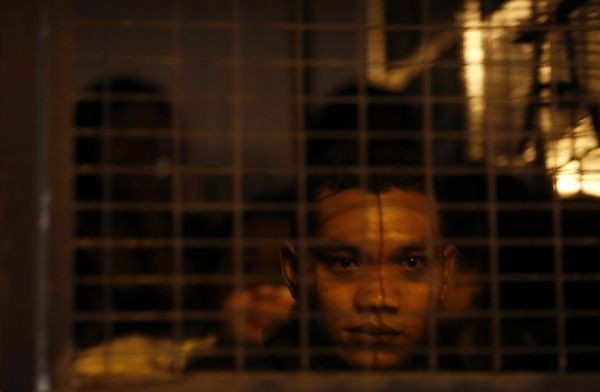A Tale of Two Crises: Illegal Immigrants In Tanzania And Malaysia

The global crisis in illegal immigration and the plight of desperate people seeking work in foreign countries has added two more grim chapters in very different states that are located almost 5,000 miles from each other. In the east African nation of Tanzania, the government has expelled thousands of what it describes as “illegal” immigrants from Rwanda back to their homeland next door over the past month. Many of the migrants were also sent to Burundi, which is located just south of Rwanda, as well as Uganda. The expulsion order came from Tanzania's President Jakaya Kikwete who also characterized the migrants as “criminals.”
The Tanzania Daily News reported that nearly 11,000 illegal immigrants – comprising about 6400 Rwandans, 4100 Burundians and 300 Ugandans -- who were living in Tanzania’s northwestern Kagera region (which borders Rwanda) have been duly expelled. "Some of the aliens left with many livestock," George Kombe, Kagera’s Regional Immigration Officer, told the paper, estimating that 5,000 cattle moved to Rwanda along with the deportees. "The aliens were rounded up… we are finalizing immigration procedures.” Tanzanian officials declared that they were not targeting any specific nationality for expulsion, but rather made the decision to expel immigrants to clamp down on alleged incidents of “armed robbery” and illegal grazing.”
However, according to a report from BBC, the mass deportation may have arisen from a diplomatic conflict between the governments in Tanzania and Rwanda concerning their mutual neighbor, the Democratic Republic of Congo. Having dispatched troops to DRC as part of a new UN peacekeeping force designed to quell the activities of the Congolese M23 rebel organization, Tanzania likely fears that Rwanda may retaliate in kind – given that M23 is widely believed to be supported by the Rwandans. In response, Rwanda has denied that is seeking to foment any row with Tanzania (or that it provides any assistance to M23).
Consequently, the Rwandans being forcefully removed from Tanzania play the role of helpless pawns in a regional political struggle they have no influence over. Seraphine Mukantabana, Rwanda's Minister of Disaster Management and Refugee Affairs, explicitly told BBC that the expulsion of Rwandans from Tanzania was politically motivated, citing that many deportees were women, children and the elderly. (AllAfrica.com reported that at least 75 percent of the refugees are indeed children).
Most of the expelled Rwandans had lived in Tanzania all their lives, but lacked citizenship papers, making them vulnerable to removal. One of the deported Rwandans, a pregnant woman named Vestine Kampundu, was born in Tanzania and has never visited Rwanda before. "When [Tanzanian] police came to my home, my husband was not present,” she told BBC. “They asked me to show documents and I gave them [my] birth certificate because that's what we used there but they said it was not sufficient and told us 'go back to your country’.” She added: "My husband had a work permit as well but they said they wanted to see citizenship cards and only citizenship given during President Nyerere's era," referring to Julius Nyerere, the leader of Tanzania during the 1960s to the 1980s.
Kampundu explained why she and many other Rwandans in Tanzania did not bother to apply for citizenship. “Local [Rwandan] leaders used to tell us that if you are born in Tanzania and have a birth certificate, it is enough to confirm you are a citizen," she said. "Even some of those leaders don't have the documents they were asking from us to prove our citizenship. They also have birth certificates only."
While Rwandan government officials are vowing to help the returning migrants assimilate, the country is even more impoverished than Tanzania and also densely populated. Meanwhile, Rwanda must deal with the immediate needs of the thousands of returning evictees now languishing in resettlement camps. "We are doing everything to help the returnees get accustomed to the new environment... by cutting bushes around the camps, we are taking precautions to check serious problems related to… diseases," Mukantabana said, according to AllAfrica.com.
On the other side of the world, another country is making plans to expel its own illegal immigrants, but on a far larger scale. Authorities in the Southeast Asian state of Malaysia have detained thousands of illegal migrant workers, primarily from Indonesia, as part of an ambitious crackdown designed to ultimately remove half a million undocumented aliens from the country by the end of the year. In what is being described in western media as Malaysia biggest ever round-up of illegal immigrants, the state has deployed tens of thousands of police and soldiers to find and arrest those without proper working papers. Security officers have searched likely areas for undocumented aliens, including palm oil plantations, construction sites and illegal house settlements, forcing uncounted thousands of people into hiding.
Authorities, who said they will repatriate the migrants home by ship, also warned that they plan to prosecute any Malaysians nationals who help illegal aliens evade the crackdown. This larger operation also targets migrants from Bangladesh, Burma, Philippines, Cambodia, Vietnam, India, Pakistan, China, Nigeria, Thailand and Nepal, all of whom were attracted to jobs in Malaysia’s palm oil and construction industries. However, an economic slowdown and fears of crime have turned many Malaysians against these guest workers.
"This is an ongoing operation and we will not compromise. Our target is to achieve zero illegal immigrants,” Malaysia's Home Minister Datuk Seri Ahmad Zahid Hamidi told reporters, according to Bernama, the state news agency. “This shows the seriousness of the Home Ministry and Immigration Department [to flush out the illegal immigrants]. Ours is not a spur-of-the-moment action.” But the Home Minister assured that expulsions will be carried out “in accordance with the principles of international law” and avoid “human trafficking.”
© Copyright IBTimes 2024. All rights reserved.





















